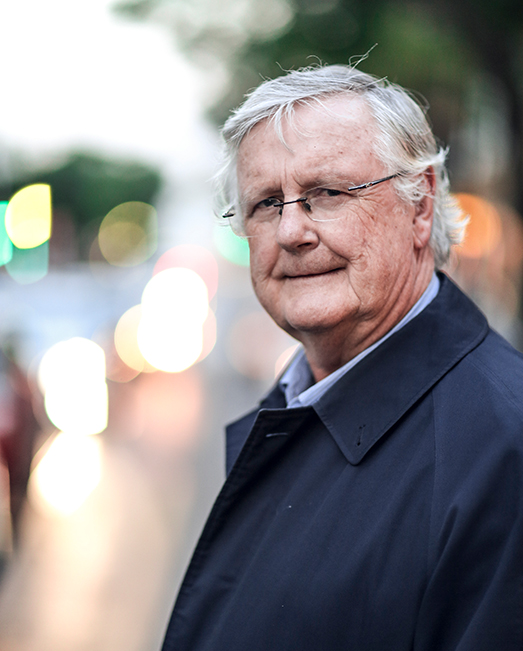Career
Copyright@ Australian Catholic University 1998-2026 | ABN 15 050 192 660 CRICOS registered provider: 00004G | PRV12008
Copyright@ Australian Catholic University 1998-2026 | ABN 15 050 192 660 CRICOS registered provider: 00004G | PRV12008

Graham Thomas QC has defended serial killers, mobsters and battered women, in some of Australia’s most famous cases. He knows about keeping a low profile when you’re in the spotlight.
Graham Thomas QC has had every type of criminal case there is. From the tawdry and sensational, to the heartbreaking and downright awful, the barrister has seen them all. But you won’t find him sharing the details with his mates on the golf course.
“Friends and reporters would sometimes ask if I had an interesting case, and I’d usually just say no, not really. It’s not my job to promote interest in a trial, especially if my client did not wish publicity. Some people have lots of entertaining stories to tell at a dinner party, but not me.
“In almost every case there is a human story which far outweighs its sensational aspects.”
The retired QC has been involved in “too many murder trials to count” in Victoria, largely as defence counsel. While some of his cases made headlines around the world, it was the trial of Cheryl Bradley in 1994 which made a lasting impression.
For more than 25 years her husband James had tormented her every waking moment. On eight occasions she fled from him, and each time he pursued her relentlessly.
“That was one of the earliest battered women cases in Australia, and if you heard all the details of what her husband did to her you wouldn’t believe it, it was far worse than anything you could ever imagine,” Graham said. “In the end she shot him in the head and buried him in the front garden. His body wasn’t found for a year.”
Graham defended Cheryl in the Supreme Court of Victoria, and she walked free after a jury accepted her defence of provocation.
“When you stand up and defend someone like Cheryl Bradley it is elemental in one way. What is the value of a human life? It was so very important that people understood what happened to her.”
Born in Melbourne, Graham went straight into law school, after he “walked into Melbourne University planning to enrol in commerce and came out having enrolled in law.” After several years as a commercial solicitor, he left suburban Melbourne behind for the grey and grime of London.
“I was raised in the ‘50s, and I’m a proud Australian, but back then Australia didn’t have too much to offer. I didn’t know any better, but I could see what was happening was too confined, too narrow. I thought there was a world out there I might want to have a look at before I settled down.”
He taught a remedial grade of mainly West Indian migrant kids in the tough working class suburb of Harlesden, in northwest London – a time he still remembers as his best working year.
“I was told the two previous teachers had suffered nervous breakdowns. The kids were hard to control initially but when we settled down we had a great year.”
Graham spent 1969 hitchhiking back to Australia – through Europe, Turkey, Iran, Afghanistan, Pakistan and India, and then into Thailand, Malaysia and Indonesia.
Back in Australia Graham looked for a teaching job, but didn’t have the necessary qualifications. At a friend’s suggestion he applied for, and got a job at Turana – the Victorian remand centre for 14 to 21 year olds who had been sentenced by the courts.
“Turana [had] about 300 detainees. I was a superintendent, and I played a part in breaking down the system of placing kids in large institutions. It’s a poor starting point, putting offending kids in with other like kids. You have to work hard to counteract the influences they have on each other.”
As superintendent from 1973-76, Graham was responsible for overseeing the welfare and security of the children, and attempting to tackle the underlying issues which had gotten them into trouble in the first place.

“I was a bit worn out at Turana, and not the sort of wearing out that a holiday could cure,” he said. “With social work you run perpetually exhausted really, because the people you’re dealing with are just about limitless in their demands on you.
“I had a young family and was pretty busy all round. In 1976 I went to the bar, and planned to park myself there for a little while before getting back into social work. But I found it absorbing and it had the great benefit of closure. When you’ve finished a case you just write up your brief and send it back.”
Over the next three decades Graham defended hundreds of clients, and handled his share of high profile cases. One was the trial of 38-year-old Tony Lock, who on a Sunday morning in 1995 attempted to banish his adult demons by killing his childhood tormentor with an axe. Gordon Kerr had begun assaulting Tony from four years of age.
“He was a destroyed fellow. People often build up an idea of what people charged with serious offences are like without actually speaking with them. The image is often one of a monster, a slavering person who is going to jump on visitors, lawyers included. But I never found that to be the case. Lock was just a destroyed person,” Graham said.
“The killing was a terrible thing, but you could see what he was on about there really. I wanted to represent him, and tell his story very forcefully – which we did.”
At his trial the following year Tony was sentenced to just 15 months, time he had already served.
And for Graham, it never mattered whether or not he shared his client’s point of view; he defended each and every person as vigorously as he could.
“I see ‘innocent until proven guilty’ as being a highly significant and important feature of our legal system. ‘Prove it if you can, and over my best endeavours’. If we don’t have lawyers do that we’re all as a society much the worse for it.
“It has been my job to defend as well as I could, and if I got an acquittal I always thought that was a cause for celebration, and never the system failing. The system, which is a fair system, worked.
“Once we start to vary from proof by evidence to proof by media report, or proof by police suspicion, well, let me tell you, I’m going to fight hard to never let that happen.
“Ultimately it’s the client’s story: I’m not the story. I always thought that we lawyers should take a back seat rather than seek the limelight. I may be lonely among barristers in that respect.”
Graham Thomas QC is a mentor for ACU law students. Find out more about studying law at ACU.
Copyright@ Australian Catholic University 1998-2026 | ABN 15 050 192 660 CRICOS registered provider: 00004G | PRV12008